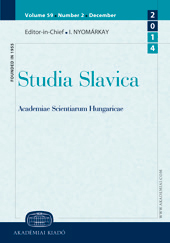Turkic Loanwords in the Slavonic-Russian Pentateuchs Edited According to the Masoretic Text
Turkic Loanwords in the Slavonic-Russian Pentateuchs Edited According to the Masoretic Text
Author(s): Alexander I. GrishchenkoSubject(s): Comparative Studies of Religion, History of Judaism, Comparative Linguistics, Eastern Slavic Languages, 15th Century, 16th Century, Biblical studies, Turkic languages
Published by: Akadémiai Kiadó
Keywords: Biblical studies; Old Russian; Turkic; Old Testament; Jewish-Christian relations; Muscovy; Grand Duchy of Lithuania;
Summary/Abstract: This article presents eighteen glosses and emendations borrowed from Turkic dialects into the Slavonic-Russian Pentateuch edited according to the Hebrew Masoretic Text (in manuscripts from the 15th–16th centuries). The first group of these words – including proper names – has Arabic or Persian origins; they came into East Slavonic with obvious Turkic mediation (Skandryja ‘Alexandria’, Bagadad ‘Baghdad’, Misurʹ ‘Egypt’, Šam ‘Damascus’, Isup ‘Joseph’, sturlabʹ ‘astrolabe’, soltan ‘sultan’, olmas ‘diamond’, ambar ‘ambergris’, and brynec ‘rice’). The second group is proper Turkic: saigak ‘saiga antelope’, ošak ‘donkey’, katyrʹ ‘mule’, kirpič ‘brick’, talmač ‘interpreter’, čalma ‘turban’, and saranča ‘locust’. The author agrees with the hypothesis that this glossing/emendation was made for the East Slavonic Judaizers. Furthermore, the author suggests that there was participation of a group of merchants interested in a new and mysterious knowledge promulgated by learned rabbis.
Journal: Studia Slavica Academiae Scientiarum Hungaricae
- Issue Year: 61/2016
- Issue No: 2
- Page Range: 253-273
- Page Count: 21
- Language: English
- Content File-PDF

